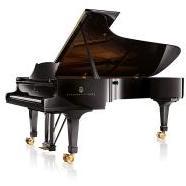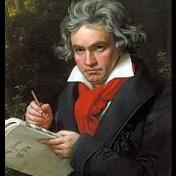Leaderboard
Popular Content
Showing content with the highest reputation on 08/04/2019 in all areas
-
Well, just to throw my two penneth in, I really believe that "originality" in the basest sense of the word, doesn't really exist. We have even had works of complete silence, so if you can tell me a style or genre that doesn't yet exist, (which by definition, can be the only "original" form of composition, then I would love to know it. In the past, "Classical music" didn't exist either, there was just music. There weren't enough alternatives to warrant a distinction between genres and so the term Classical music was never applied to the likes of Bach, Handle, Mozart, Beethoven etc., in their own times as they were really considered the pop musicians of their day. Now that we do have the distinction, we have to consider who we want our music to appeal to. The vast majority of ordinary classical music lovers, the general public, which is the greatest audience for our craft, still prefers tonal, melody led music with conventional harmonies and meters. It really is a much smaller proportion of the audience, (still a huge number however), that are looking for "new original" music. Given that on one hand, anything you write, provided it is not a direct copy, is original, and on the other hand, since everything has been done before, nothing is original, then really the only thing that remains, is a question of individual taste, and to which audience you want to appeal. I think also, if you get caught up too tightly on trying to be original, then you compromise yourself in as much as the reason you are writing, is not because "es lo que sale de los cojones" (this is what comes out of your soul), but rather to try and prove something to either yourself or to others, and I don't think that should really be the motive for producing art, of any description. Although I should also say that ANY motive for producing art, is a valid one, as long as something is being produced that someone else can appreciate on whatever level, then it's good.2 points
-
This is a great discussion point - and one that I think the world of composition needs. There is no secret that I am a tonal composer. It's just the music I enjoy writing and listening to. As a composer, whichever combination of tones you use will create something that is unique to you, whether is be 5, 7, 8, or 12. Provided you are not copying a piece directly, then it is original enough. The biggest problem comes from exposure. Why would a (paying) audience go to see a symphony by an unknown composer which sounded Classical, rather than their favourite Mozart one. Here lies the problem with originality - performances. Bottom line, if you want to write tonally, do it. It's still original. However atonal music is more likely to be performed, which brings me to the next point. I, as a composer, want to write music that I enjoy. If someone tells you what style of music you should write, then that will ruin the enjoyment of music for you. This is the problem with conservatoires, who tend to only accept people with an avant-garde style which they consider to be more original. Not to attack John Cage, but silence? Seriously!? Disclaimer: I mean no disrespect to atonal/avant-garde composers. You are all equally skilled and creative. I just personally don't like the style. If even one other person besides me listens to my music and enjoys it, then I feel like I have succeeded in a way. I would like to get my music performed but composition isn't my main pursuit in music so I don't mind as much. New music ensembles tend to only want to perform avant-garde pieces, and traditional orchestras generally do not accept pieces from budding composers. As a composer, I want to reach out to other musicians and show them what I have worked on. You could say I am trying to "revolutionise music" because I want to show the world that tonal composers still flourish, even though they are looked down on by competitions and festivals. I thought about this a few months ago. I love the works of the greats from the last few centuries. It appeals strongly to me, because my ear - as most ears do - perceives it as right. Tonal music is designed to be pleasant - but that doesn't mean it is limited to what most non musicians think classical music is. Take two birds sitting on a branch. One sings tonally, the other races rats over a finish line and sings the notes in the order that they place. Which one will get a mate? The ear - our ear, an ant's ear, a bird's ear - likes the harmonic relationship between the frequencies of a tonal scale. My style, as I have said before, is tonal, but I like to experiment with the changing harmonies caused by a chromatic movement. Listen to this simply beautiful piece by Grieg. I didn't play it for a while, because from looking at the score I could see it had a lot of chromaticism. But it is still tonal, and this is what I try to write. I don't count myself as a pastiche of Grieg, because I draw my style from another source. Scotland has a rich traditional music heritage, and if you listen carefully to some of my most recent music (not posted here yet) you can hear the influences from playing fiddle in a school folk band. I even write specific Scottish traditional pieces to play in the group, although that is not the main part of my output. My style? Tonal×Accidentals×Scottish Music Music is so subjective. Thanks for sticking with me, it's my longest post ever.2 points
-
Hey there, I'm new to this forum ☺️. I just wanted to put my latest work/composition "The Door Beyond" here. It is a mixture of a few old compositions of mine edited with logic pro to one big song. I am excited what you think about it.1 point
-
Hello, This is my new track, I hope, you'll like it. What is your opinion? I'm really interested in!1 point
-
Hi guys, would like to now what you think about the composition. Its hard to say in which direction it realy fits, I would say ambiental-classical. DAW: Cubase 10 Elements VST Instruments: Arturia V Collection, EW Steinway Piano VST Effects: Fabfilter Cheers!!1 point
-
1 point
-
Hi 🙂 I present you here my new short piece for string quartet. It's called "L'été", which means "Summer" in French 🙂 Have a nice day 🙂1 point
-
1 point
-
I always use Hollywood Strings, Hollywood Brass, Hollywood Percussion, and most times Stromdrum 3 for the 'Lord of Toms' instrument. Recently I've also been using Silk for my current composition.1 point
-
1 point
-
EWQL's Hollywood Strings Diamond if talking about orchestra, and EWQL's Silk if talking about the Chinese instrument. (Note: Converting WAV to MP3 makes the music sound bad but it's the only way I can actually post here.)1 point
-
1 point
-
LOL, I know what cojones means, I live in Spain and am married to a Spaniard, so I speak Spanish very well, but to translate literally would not be understood in an English speaking forum. Pero en Español, es un frase muy comun, que significa, mas o menos, lo que he dicho, por lo menos, en este occasion.1 point
-
I lack the higher level of music education that a lot of y'all have, so my thoughts aren't based on knowing a ton of music history or advanced theory. I do have an opinion, though. It's already been said, but if we define 'originality' as some metric of how 'brand spanking new' something is, then nothing is truly original. We're always drawing influence from ideas and sounds we've already observed or experienced, musical or otherwise. That's why I don't like that way of thinking. There's definitely some merit in being able to accomplish your goals by doing something bizarre or unusual with your music, but no one should be surprised that most listeners aren't flocking to hear that stuff. Using your musical abilities and adding your own ideas to pre-existing styles and forms (like what @Monarcheon was talking about) can be a good way to find originality too. Not to say modernism is a bad thing, but over-asserting its importance as a way of advancing music seems silly to me. Personally, I'm finding it very fulfilling to reharmonize and re-arrange music for my church, giving it more color and energy. I don't do it as a way to be original. I just do it because I like it and I think worship music these days is really lackluster. Originality is a worthy goal, but it's not one that I'm interested in chasing. Instead of seeking it out, I'm hoping that honest effort and an open mind will bring me there naturally. Also sorry, but cojones means balls.1 point
-
@caters I must say that I personally do not think that atonality has "ruined" music, rather taken it down a path that no one in centuries past expected. I don't like Schonberg's atonal music (as a personal taste) but as a composer he did so much more, and I find some of his early works pleasant. What I don't like is people that copy Schonberg's atonal ideals, as so much music composed these days is.1 point
-
1 point
-
I honestly think that atonality has ruined classical music and that we need something like a Classical Period Revival. I compose my music with this in mind, focusing on the classical and romantic periods as far as influence. It isn't that I don't like say Shostakovitch, a modernist. I do, mainly because even in his most dissonant works, he stays tonal. In fact, a few people have said that my Waltz in C minor sounds like Shostakovitch, when I was actually aiming for a more Beethovenian vibe to it(thus the use of the Fate Motif and fitting it into a waltz rhythm). But I absolutely do not care for Schoenberg and his atonality because atonality means extreme dissonance and could mean a dissonant ending that never resolves. That is just wrong. 12 tone writing, sure, I don't mind as long as I can harmonize it with a completely tonal chord progression. Complete atonality, absolutely not except in a few cases like Mars by Gustav Holst, where it sounds more like competing keys than true atonality. Extreme dissonance that nevertheless resolves, absolutely, that is very typical for Beethoven, my absolute favorite composer. Extreme dissonance that never resolves, no, it's just wrong. Polytonality, again, I don't mind it, and I have used it a few times, but only with keys that guarantee consonance, such as C major and A minor being played simultaneously. C major and Eb major is another one of those consonant key pairs, but to me at least, it doesn't sound polytonal in most circumstances. Instead, it just sounds like the whole thing is in C minor, even if it breaks down into a melody in Eb and a bass line in C. As for originality. I think that as long as it isn't a complete carbon copy or very simple tweaks compared to the source, it is original. So if the melody and bass are the exact same but the instrumentation is different, original. If the melody is tweaked and the bass is completely different, original, If both are completely different, original, And of course improvisations like my Waltz in C minor would be original as well. As for whether I would consider the piece that I have recently been working on, The Beethoven Variations, which is based off of Beethoven's fifth, to be original, I would because of multiple reasons listed here: Different instrumentation from Beethoven's fifth(String quartet in my piece vs Orchestra for Beethoven's fifth) I'm only taking the first theme of the first movement as a basis for my piece, nothing else I'm composing a Theme and Variations, and it is very typical for the variations to be original to the composer who wrote a Theme and Variations, while the theme is from a different composer or is a folk song or nursery rhyme1 point
-
I appreciate the little surprises in there every so often to keep it from getting too nocturne-ish. In your score, I would perhaps suggest marking how you want those grace notes to be played, since more classical interpreters would take it to mean a pretty fast ornamentation rather than what's done in the recording.1 point
-
@pateceramics I was worried the beginning dissonance would come across as out of place, but I'm glad you saw (or heard) it in context! I also forgot to attach the updated score. It seems so foreign to me to hear bass notes sounding in the treble clef, so I always change the tenor to bass clef when I'm writing the music. Then without fail I forget to change it back! 😂I totally forgot about a piano reduction; I'll fix that in the very near future! Your feedback is extremely helpful... and hopefully they'll choose this piece for the service!1 point
-
I'm actually impressed that you were able to pull together a demo of such good quality. It's not the easiest music and doing multi-track recording is an art of its own. William Blake's poetry is always a great place to start. I assume you're aware of the place of this particular poem in history, but for anyone else out there reading this later, this was part of Blake's "Songs of Innocence" and "Songs of Experience," written in response to reporting of horrific child labor conditions in Britain. Blake, and later Dickens, and Elizabeth Barrett-Browning, among others, tried to use their literary skills to change hearts and minds and get legal reforms passed to protect children from poor backgrounds from abusive working conditions. Blake did a lot of contrasting of innocent, peaceful childhood with the more common fates of children at the time. The harmonies in your first "sleep, sleep" section do a nice job of foreshadowing that line between sweetness and danger, very appropriately to the text and larger context of this poem, and then "all creation slept and smiled" is just lovely, and you keep turning the dial back and forth on the tension throughout the piece. It works very well. Conventionally, here in the US, your tenor line should use a different clef, if you write this out as four separate staffs, but I don't know what is common with publishers where you are. It might be helpful to provide a piano reduction for rehearsals. Sounds lovely! I hope you get a recording of the Candlelight Service!1 point
-
Hi, Theo. Here's how I handle that issue. Change the time signature to whatever you need to so you can make that tuplet. Then hide the time signature and the tuplet number. You can also make all the tuplet notes "small" notes through the function with keypad. You can see that I did that with Sibelius (quite effectively, I think) using that method on page 16 of the attached document. I realize I'm a little bit late, but I hope this is still helpful.1 point
-
You seem to lean in on dissonances in this one, part of your style, I've noticed, but this one especially. Parallel sevenths and what I'm guessing are intentional dissonant resolutions are found throughout. My only complaint with this comes when it's done with too much oblique motion or P8's, like mm. 16-17 in the upper voices. I don't know if it was intentional for spots like that to be "text painting" on "dwell", but they never seem very helpful in thematic establishment; rather, it seems like a gesture that kind of has an opposite function. Interesting work, overall.1 point
-
1 point
-
1 point
-
I actually do remember listening to this one a couple weeks ago. I love that it starts in D-flat (one of my favorite keys). I also love all the moving parts. I'm not sure if there is a greater sound on earth than the mixing of human voices together in song! However, it doesn't seem too difficult; I'll bet there are church choirs who could easily tackle this, so I hope you get to have it performed! Musically, one issue I see is the occasional doubling of the soprano and alto. Try to keep them from ever landing on the same notes. Also, you might consider putting in some breath marks for the singers. Singers can typically figure out their own, but it helps to have the composer do it so everyone on the part breathes at the same time. Aside from that, great job! Is this supposed to be performed a cappella? I love a good a cappella piece!1 point
-
1 point








